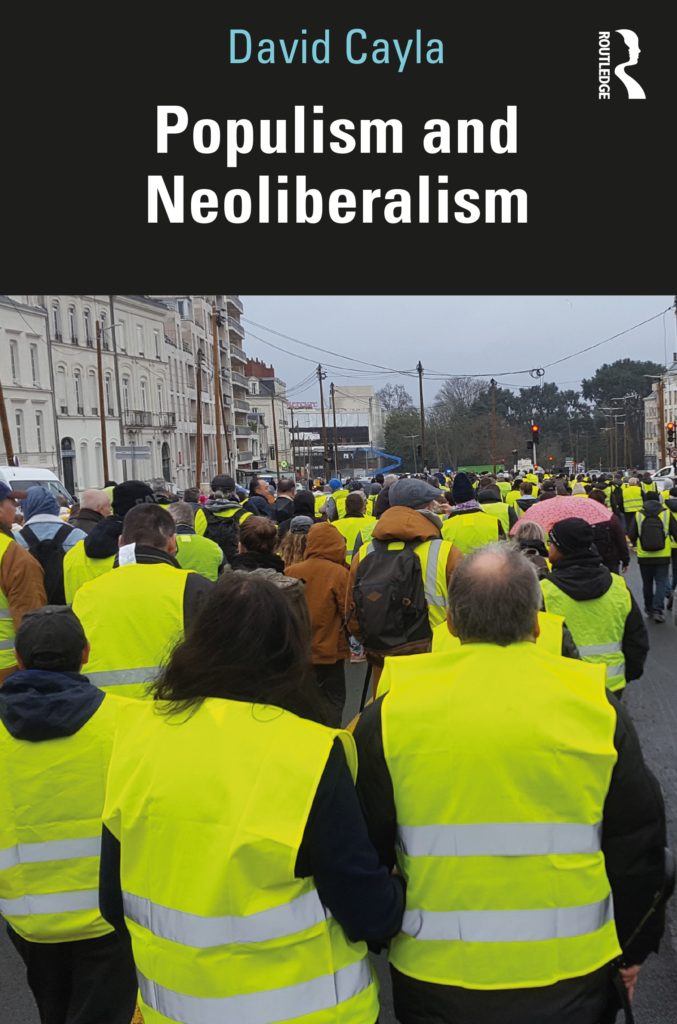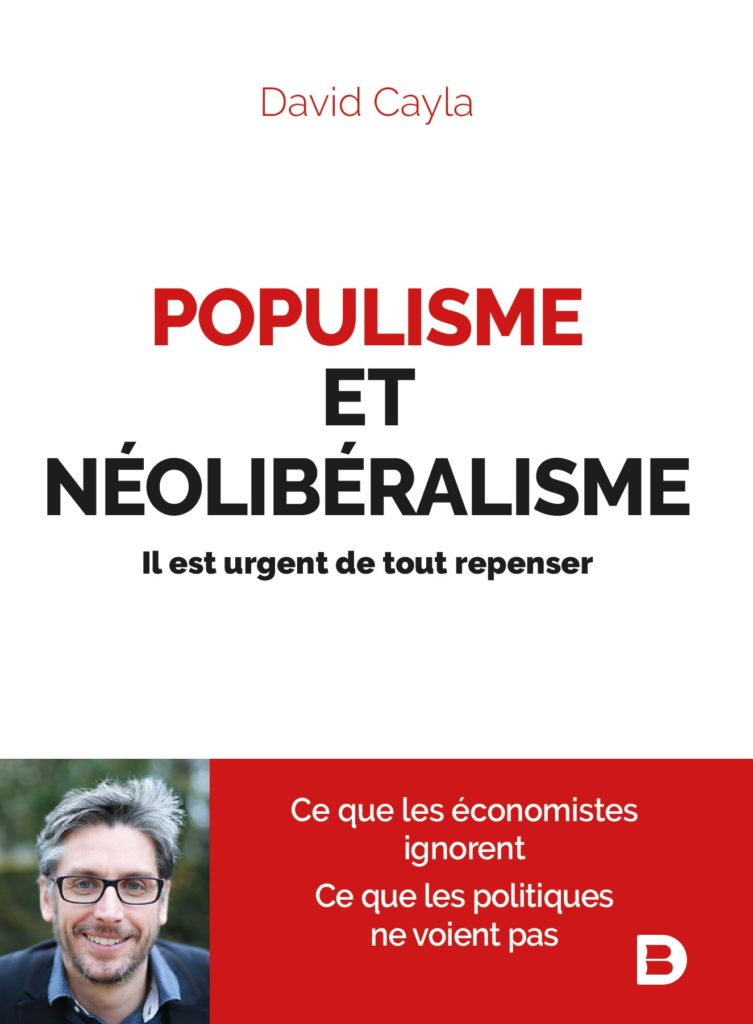What is populism? What is neoliberalism? Is there a link between the two? These are some of the questions to which David Cayla provides some answers in his book Populism and Neoliberalism(De Boeck Supérieur editions). In this wide-ranging interview with Feat-Y, this economist, who is also a member of the collective Les Économistes Atterrés, discusses the emergence of populist movements due to the accentuation of neoliberal policies and that the promotion of ecological policies must go through a break with neoliberalism because one of its fundamental pillars is free trade, which justifies globalization. Interview.
Feat-Y: How have the changes in the economic and social structures of the European Union generated heterogeneous populist movements within it?
David Cayla: That’s a very good question because you raise two important points. First, that the functioning of the European Union is a factor in explaining European populism. Secondly, that this populism has to be conjugated in the plural because there are different forms of populism that appear in Europe.
I think it is important to understand these differences. It is not only in Europe that there is populism, but Europe is undoubtedly one of the main hotbeds. In France, one thinks of the National Gathering, the anti-mask or anti-vaccine movements, the Yellow Vests. These movements are very different from each other and do not necessarily agree on the proposals. There are also important populist movements in Central Europe, in Poland and Hungary, in the so-called Visegrád Group, which also includes the Czech Republic and Slovakia. We find populist parties in Italy that carry electoral weight, as well as in the rest of Southern Europe.
What are the causes of this European populism? The analysis that I propose in my book is that it is the neoliberal management of the European economy that tends to destabilize societies. But what is this neoliberalism? It is essentially the single market and the regime of the four freedoms that allows the free circulation of goods, services, capital and labor. The last two freedoms are very important. They lead to a concentration of industrial investment in a few countries, especially countries close to the North Sea, around Germany and include low-wage countries close to Germany such as Poland, the Czech Republic and Hungary. These countries are becoming low value-added assembly platforms dependent on German industry.
Similarly, the free movement of labor implies very important population movements between European countries. For a long time, these migrations went from East to West, i.e. from low-wage countries to higher-wage countries with better working conditions. Since the euro crisis in 2011-2012, population movements have moved more from the South to the North, especially in Germany, which in a very short time has become a land of immigration, whereas it previously had almost zero net migration.
Both the concentration of industrial investments in a few countries and migratory movements disorganize societies. The single market is creating polarization phenomena in Europe. Some countries are developing economically and attracting the most qualified workers, while others are depopulating and de-industrializing, or specializing in labor activity, such as Poland. These economic dynamics cannot be socially and politically neutral. They give rise to anxiety. When countries depopulate, it creates strong anxieties; this is the case in Central and Eastern Europe. Anxiety also arises from deindustrialization, from the feeling of national downgrading, which is today reinforced by the health crisis. All these anxieties engender a mistrust of the institutions that are the bedrock of populist phenomena.

Feat-Y: Can we say that yellow vests are a motley crew?
D.C.: The Yellow Vests had common demands and brought together people who were all waiting for a change in policy. They agreed on tax justice, the removal of the fuel tax hike… But they were not structured around a particular project. They brought together people from all sides, from the left and the right. Moreover, the Yellow Vests did not want to call themselves political and refused to be labeled anything. We can also say that it was a heterogeneous movement because they did not have a well-defined social project.
On the other hand, there are, in the movement of the yellow vests, elements that help to establish a certain homogeneity. They grouped together the working world, people living in territories of so-called peripheral France. What also characterizes the Yellow Vests is a mistrust of institutions and state representatives, but also a call for public intervention. In this sense, it is not a conspiracy or a movement that seeks to criticize everything, to be afraid of immigration. Moreover, migration themes were not very present at the time of the Yellow Vests. It is a movement that, for me, is a form of left-wing populism, which defies institutions without, at the same time, defying everyone. The defiance expressed by the Yellow Vests is much more structured than what can be seen in the United States, where certain pro-Trump movements are often conspiratorial, even paranoid. They end up no longer trust their institutions in their neighbors and they withdraw into their own sectarianized community, which is at odds with the rest of society.
What is interesting about the Yellow Vests movement is that there was no break with the rest of society. On the contrary, he wanted to embody France in its diversity. It was a movement that showed a form of unity, of solidarity with the rest of the population. In fact, the vast majority of the population was in solidarity with the Yellow Vests. This movement was not anti-State, anti-everything. It was a call to the State, to democratic reforms, it was not a nihilist movement.
Feat-Y : inPopulism et néolibéralismIn his book, you mention the concentration of industrial activity in Germany and Eastern Europe, referring to the thinking of the economist Alfred Marshall. Isn’t this also a reference to the concept of geographical economy?
D.C: Yes, indeed. The Nobel Prize winner in economics, Paul Krugman, reinvented geographical economics by taking up Marshall’s concepts, i.e. the dynamics of agglomeration. It’s not a new idea. I preferred to refer to Marshall because he was the first to talk about it. But geographic economics survived Marshall and continues to exist. It’s an economic thought that aims to show the dynamics of territories, to rehabilitate the territory a little, compared to an economic thought that is very abstract and that resonates from models. Krugman also makes models, which is why he won the Nobel Prize. But he is more empirical.
Feat-Y: In one of the chapters of your book, you list the different currents of thought claiming to be liberalism or neoliberalism. What are the main points of convergence and divergence between these currents, in your opinion?
D.C: Liberalism is a word in which we put many things, and often contradictory things. As proof of this, I would like to point out that in the United States the term liberalism refers to left-wing ideas, whereas in France and elsewhere in Europe, we tend to think that liberalism designates a right-wing ideology.
Liberalism has always been an ambiguous term. My feeling is that it is first and foremost a philosophy that originally aimed at the emancipation of individuals. We find this idea in John Locke, one of the great thinkers of English liberalism, but also in Jean-Jacques Rousseau and other authors of the Enlightenment who considered that the individual exists independently, and that he must not be subjected to the community, to institutions that are beyond him such as religion, the State or the family. This is, I think, the heart of liberalism. Once we’ve said that, we haven’t said much, because what does it mean, to emancipate oneself? It doesn’t necessarily mean breaking all ties with the state, the family or religion, because an isolated individual cannot really be emancipated. So liberalism expresses a form of duality that oscillates between detaching oneself in order to be free, but at the same time, hanging on to exist. The individual is a social being who cannot be totally free if he is not in relation with others.
From there, we necessarily have different approaches to liberalism. A conservative approach, focused on economic issues, what I call Manchesterian liberalism, which is inspired by Ricardo’s ideas, but also by the physiocrats from whom he borrows the maxim of “laissez-faire, laissez passer”. This conservative liberalism defends the idea that the State should not intervene in the economy and conceives of emancipation as an absence of any State constraint, because it defends the idea that markets would produce a kind of “natural order”. Other liberals, notably Adam Smith, explained that the individual cannot be free if there is no regulatory state that can, for example, create social laws that allow the education of individuals.
What is interesting is to see that this liberalism, initially emancipatory, which became conservative in the 19th century, did not work because it stumbled in the face of important problems of coherence. Confronted with crises, it had to admit that the market is not an institution that emerges spontaneously, that it must be regulated. Contemporary neoliberalism, which I detail in the book, is a kind of neo-manchesterism that aims to repair the market, to organize it through the intermediary of the State, so that the market can exist without the State, paradoxically. It is a somewhat flawed philosophy that includes state intervention in the repair and organization of the market, but excludes it in the day-to-day functioning of the market. This neo-liberalism is the ideology that conquered the world in the 20thcentury and is at the origin of a set of reforms that accelerated from the end of the 1970s.
This neoliberalism differs greatly from Smith’s liberalism. What is forgotten is the principle of emancipation. One does not seek to put the State at the service of the emancipation of the individual, but at the service of the market, which completely changes the situation with respect to the original objectives of this thought.

Feat-Y: Doesn’t the neoliberal current, which has been dominant since the 1980s, especially at the academic level, lead to a certain alienation in the teaching of economics, because of its simple, even simplistic approach?
D.C: A small distinction should be made. Neoliberalism is not an economic theory and, from my point of view, it has not conquered the academic sphere. It is another thought that has conquered the academic sphere, neoclassical thought. They should not be confused.
Neoclassical thinking aims at designing the economic system, not at advocating economic policies in the strict sense. Where there is a link with neoliberalism is that the evolution of economic thought means that it now places the market at the heart of its analysis. The big difference between neoclassical thought, which emerged at the end of the 19thcentury, and Smith’s so-called classical thought is that in Smith’s view the heart of economic analysis is the production and distribution of wealth. The market is secondary. It becomes a priority in contemporary economic thinking, which seeks to imitate mechanics, physics and hard sciences, trying to understand economics based on a certain number of simple rules. This is when the laws of supply and demand and the use of curves will become generalized. Changing the focus from the science of abundance, of wealth production, to the science of scarcity, of market allocation, will justify neoliberal economic policies whose objective is precisely to make the market work.
For example, it is now considered that the problem of unemployment is only a labor market problem and that the question of growth is only a question of capital allocation. In other words, all economic thinking can be solved by the market. When we switch to such economic thinking, we will logically end up considering that the goal of the State is to make the market work. But this is not systematic. There may be neoclassicals who are not neoliberals, or who do not consider themselves neoliberals, because neoclassical thinking is a conception of economics and neoliberalism refers to political recommendations.
Feat-Y: In your book, you insist that populism and neoliberalism are a pair. And in the event that neo-liberalism were to emerge, would populism follow suit?
D.C.: For me, the only way to solve the problem of populism would be to come out of neoliberalism. The two are indeed complementary, more than opposed. Populism and neoliberalism are two sides of the same coin, in the sense that populism feeds on mistrust of institutions and that this mistrust is the product of political thinking that aims to restrict the power and capacity for action of governments. This mistrust is a direct consequence of the feeling of impotence of the state, which seems incapable of managing a pandemic, but also incapable of solving the problem of unemployment and incapable of reindustrializing the country.
This incapacity of the state is an organized incapacity. Neoliberalism, once implemented, consists in suppressing, one by one, the levers of action of political power. People inevitably end up saying: “What’s the point of voting, of trusting leaders who are incapable of solving our problems? “That’s where populism comes from. Once we put the State back at the heart of the economy, once we rehabilitate the tools of State intervention, the rulers can act and the feeling of powerlessness disappears. Putting an end to neoliberalism is essential to put an end to populism.
Feat-Y: Would a relocation of certain industrial activities, through protectionist policies, contribute to ecological policies, in your opinion?
D.C.: It is absolutely essential, for several reasons. The first is that the fewer miles the goods travel, the greener they are. The advantage of the local is that it consumes much less energy than when goods have to be brought in from far away, since transportation is one of the sectors that produces the most greenhouse gases. Beyond that, the problem with globalization is the organization of regulatory competition from one country to another. A country that is going to want to introduce environmental standards will immediately find itself at a disadvantage in global competition compared to one that does not. Globalization creates incentives, through the competition it engenders, not to set high environmental standards.
The only way to make ecological standards sustainable in a country is through protectionism. That is to say, to put in place customs duties to compensate for the productivity gap that has been created by making its production greener and introducing a certain number of standards. Clearly, this is a big unthinkable of neoliberal thinking because neoliberal thinking was conceived in the 1930s, at a time when there was no thought at all about ecological issues. Moreover, it is based on the idea of free trade, which in practice incorporates almost no social or environmental standards.
We must understand that if we want to regain political sovereignty, if we want politics to be able to act on the economy within the framework of a democratic debate, then we must regulate exchanges with the rest of the world so that the decisions we take internally become compatible with the effects of global competition.
Feat-Y: Faced with the crises of neoliberalism, especially at the beginning of the 21stcentury, would an exit from this economic phase mean an exit from capitalism?
D.C : Not necessarily. It’s true that I don’t really comment on capitalism in this book. I don’t define capitalism and I don’t try to characterize it. Besides, it has been characterized in many, many ways by various authors. I believe that capitalism is a plural economic system that can have different aspects. One can even consider that the USSR was a form of state capitalism, that 17th-century capitalism was market capitalism, that 19th-century capitalism was industrial, and so on.
Concretely, I didn’t want to go into the detail of “do we have to get out of capitalism to break with neoliberalism? “My feeling is that it is not necessary. Concretely, neoliberalism is just a particular form of organization of capitalism. It can already be challenged, without necessarily questioning the end of capitalism. Even if I personally see the idea of going beyond capitalism in a positive light, it is not my subject for the moment. I leave these reflections to others or for later.
Jonathan Baudoin
David Cayla is an economist at the University of Angers, member of the collective Les Économistes Atterrés. He is the author of Populisme et néolibéralisme and L’économie du réel, both published by De Boeck Supérieur.
Les Economistes Atterrés : http://www.atterres.org/
Photos : Manon Decremps.




